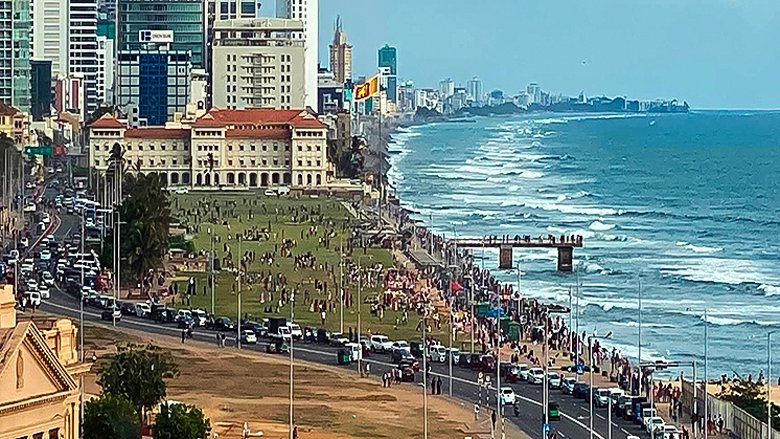Sri Lanka is facing an unprecedented macroeconomic crisis. In 2022, real GDP contracted by 7.8 percent, the poverty rate doubled from 13.1 in 2021 to 25.0 percent, official reserves declined from US$7.6 billion in 2019 to less than US$400 million (April 2022), and the Sri Lankan Rupee (LKR) depreciated by approximately 81 percent against the US Dollar. Fiscal indiscipline, linked to anemic revenue collections, led to higher fiscal deficits, public debt, and unsustainable gross financing needs (GFN). Debt reached unsustainable levels (118.7 percent of GDP at the end of end-2022)[1] and the loss of access to international financial markets in 2020.
Amid depleted reserves, Sri Lanka announced an external debt service suspension in April 2022, pending debt restructuring. In March 2023, the IMF Executive Board approved a 48-month EFF of approximately US$3 billion to support the government’s reform program. In May 2023, the program was approved in Parliament by a large majority of votes.
To emerge from the current economic crisis and improve long-term growth prospects, Sri Lanka must restore fiscal and debt sustainability and implement growth-enhancing structural reforms. The World Bank has been preparing since 2022 a series of Development Policy Operations (DPOs) to follow the approval of the IMF-supported program, and the associated reform matrix has been built to address some important causes of the ongoing crisis sustainably. Both institutions have been working in close collaboration to ensure that the reform agenda to be implemented by the authorities will strengthen current practices in the following areas: i) tax policy and administration; ii) fiscal and debt management; iii) financial stability; iv) structural and governance reforms and v) social and financial sector safety nets.
A Debt Management Performance Assessment (DeMPA) was undertaken in August 2022 to update the latest 2015 assessment of debt management practices and identify areas for improvement. While there has been some progress, such as developing Sri Lanka’s first debt management strategy (supported by World Bank technical assistance funded by the Debt Management Facility - DMF in 2018 and 2019) and debt management auditing, challenges in many other areas remain. The most critical identified areas for improvement in the 2022 assessment relate to the fragmented debt management institutional arrangement and scattered debt-related legal framework. Developing a framework for managing sovereign guarantees and on-lending and improving debt transparency practices are also critical reform areas to be pursued.
A joint WB-IMF Reform Plan mission undertaken in March 2023 supported Sri Lanka in developing an action plan to establish a centralized debt management office (DMO) within the Ministry of Finance, considering the suboptimal existing and fragmented setup between the Central Bank and the Ministry of Finance. The plan also advises the Government on necessary legal reforms for establishing the DMO and creating a single law that concentrates (existing and new) debt-related provisions. Both reforms will need to be implemented in a specific timeframe in 2023-2024 to enable the country to access the resources provided under the IMF-supported program and the WB series of DPOs. The authorities have requested TA support from the WB and the IMF to ensure that the envisaged reforms follow international sound practices and that a final proposal considers the most suitable arrangement for Sri Lanka.
The Reform Plan has also provided analysis and recommendations for developing a framework for sovereign guarantees and on-lending to be developed in alignment with other Public Finance Management (PFM) reforms (e.g., enactment of a new PFM law and SOE sector reforms). Finally, the plan covered a fourth area related to improvements in debt transparency practices, including enhancing debt recording and ensuring greater timeliness and coverage of existing debt. Implementing these reforms is also expected to be supported by WB and IMF technical assistance.
Improved debt management practices and reforms in the abovementioned areas will ensure that borrowing decisions are undertaken under a strengthened governance arrangement underpinned by a robust debt-related legal and operational framework. Improvements in debt transparency and enhanced coordination with fiscal and monetary policies will pave the way for updating a debt management strategy consistent with a robust Medium-Term Fiscal Framework. Pursuing improved debt management practices in Sri Lanka will not alone solve fiscal imbalances and bring debt to sustainable levels, but it is a key factor of the equation to help with these objectives and strengthening the country’s resilience to macroeconomic and financial shocks. Initial steps have already been taken, and the authorities are committed to starting this process by creating the new centralized DMO and a revamped debt legal framework with the support of the WB and the IMF.
[1] Source: CBSL 2022 Annual Report.

